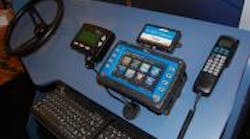“Customers are telling us they think we’ve stopped going backwards, that they are starting to see things picking up. That is why now is the time for trucking to re-tool its technology.” –David Wangler, president and CEO, TMW Systems
If there’s anything good to be said about down times like these, it’s that they offer fleets a chance to re-evaluate their position in the trucking industry and (hopefully) embark on changes and shifts in strategy in order to be ready for when business accelerates (though projections are that business won’t accelerate at any pace faster than that over an overloaded and underpowered minivan – and from experience, I can tell you that is mighty slow indeed!)
Technology, of course, is harped on constantly in this industry as a great tool for making such changes, though fleets themselves remain mixed on whether such items as in-cab computers, portable truck-specific navigation devices, and trailer-tracking systems offer the opportunity to make the positive changes that result in more profitable business from shippers.
One thing is for certain, though: the technology being brought to the fore in the world of trucking today is pretty slick and may indeed offer some opportunities for fleets, large and small alike, to make some significant shifts in their business models. I got a peek at a lot of these new and improved technologies at TMW Systems 2009 TransForum user conference this week in Nashville, TN, so I’d like to show them to you so you can decide whether they can make a difference in your operation or not.
First up is PeopleNet’s new BLU in-cab communication and computing device. It’s not cheap, costing just over $700 per unit compared to the $200 price tag of its current LCD text-based unit, but it offers the opportunity to bring a lot more capability and functionality into the truck cab for drivers and fleets alike. I’ll let them tell you about these systems so you can decide for yourself if they offer value for your operation now or down the road:
Map maker Rand McNally is also going electronic with a truck-specific navigation device of its own, dubbed the IntelliRoute TND 500. This is noteworthy because, unlike the GPS navigation devices that are proliferating on retailer store shelves, this system produces TRUCK-SPECIFIC routes, so you don’t get stuck under a low bridge or sent on a road forbidden to tractor-trailers.
I talked to one fleet manager at the show that when he sees a driver with an off-the-shelf GPS unit in his cab, he rips it out immediately because they send trucks on roads only cars can travel – resulting in all sorts of costly problems. Rand McNally’s unit ain’t cheap – it costs $499 retail, with discounts starting when you buy three or more units – but it’s worth a look:
Finally, there’s trailer tracking via satellite based systems. Now, wihile this surely isn't new technology – many fleets are already long time users – it’s being updated with a variety of new features, such as cargo sensors and the inclusion of satellite maps for greater detail within the software. It’s pretty neat stuff, so here is SkyBitz to give you a walk through:
Finally, there's a new upgrade to the Fuelmaster fuel management package developed by Syn-Tech Systems that uses radio frequency identification (RFID) technology to make refueling easier, faster, and more secure for fleets and drivers alike.
While I'm sure it doesn't work perfectly all of the time, the use of RFID in this manner really offers fleets a chance to not only control refueling operations better -- at least those coming back to a central location every day/night -- but get more accurate and timely data from their vehicles as well, with little extra effort on the part of personnel.
Like I said earlier, all of this stuff may offer new opportunities for carriers out there to become more efficient and/or drum up new business – or might not. It’s really up to you to see if technological advances, like what's shown above, fills a void, opens a door to potential new business, or offers the chance at greater efficiencies. One thing is for sure – more stuff like this is coming to market. It just remains to be seen how truckers can put it to good, profitable use.



